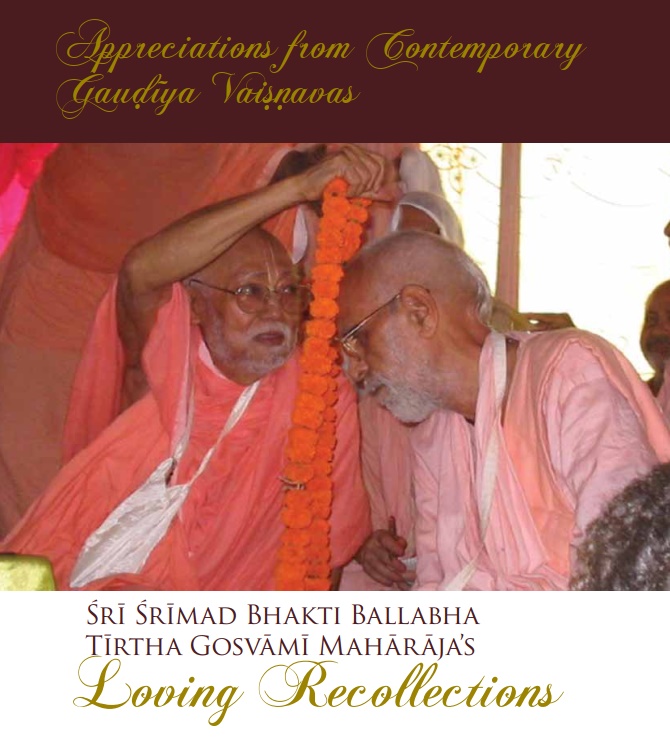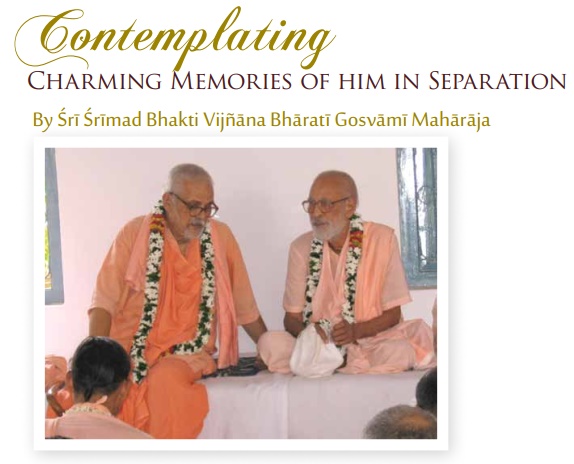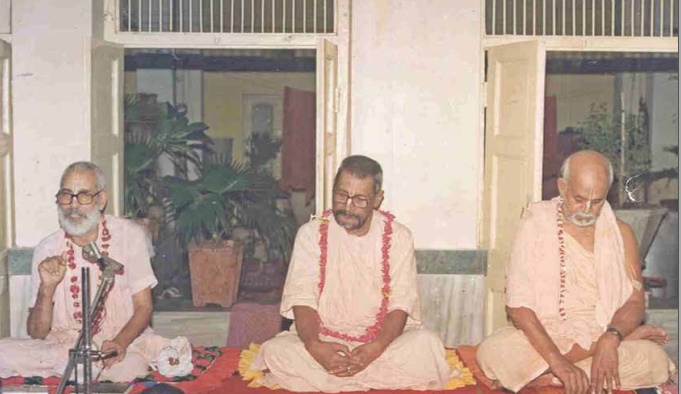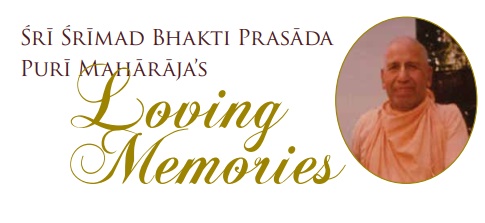Appreciations from Contemporary Gauḍīya Vaiṣṇavas

Śrī Śrīmad Bhakti Ballabha Tīrtha Gosvāmī Mahārāja’s Loving Recollections
[Written during Śrī Śrīmad Bhaktivedānta Nārāyaṇa Gosvāmī Mahārāja final residence at Jaya Śrī Dāmodara Gauḍīya Maṭha, Cakra-tīrtha, Śrī Jagannātha Purī-dhāma]
Śrī Śrī Guru-Gaurāṅga-Rādhā-Dāmodara-Jīu
To pūjyapāda Śrī Śrīmad Bhaktivedānta Nārāyaṇa Mahārāja, who has resided at Śrī Keśavajī Gauḍīya Maṭha, Kaṁsa-ṭilā, and Śrī Rūpa-Sanātana Gauḍīya Maṭha, Sevā-kuñja
Remembrances of the affection you showed me are still so fresh in my heart, even though I am unworthy of such affection, in all respects. Remembrance of how you received me at your own place, Śrī Keśavajī Gauḍīya Maṭha, Kaṁsa-ṭilā, and with your whole heart you enthused me and made all kinds of efforts for my welfare, must also be engraved on the canvas of your memory.
Although we all became grief-stricken at the sad news of your grave illness, upon hearing that by Śrī Kṛṣṇa’s desire, you have recovered somewhat, we all felt heartened and encouraged. You also might have heard the news of my grave illness. Five stents (tubes) were inserted during an angioplasty to open artery blockage. The doctor has advised me to take proper, regular rest. My movements have been checked.
I have a desire to meet with you. If you desire, everything is possible.
Please accept my countless prostrated obeisances.
Yours affectionately
Dāsabhāsa
Bhakti Ballabha Tīrtha
19 December 2010
Śrī Śrīmad Bhakti Ballabha Tīrtha Gosvāmī Mahārāja is the present ācārya of the Śrī Caitanya Gauḍīya Maṭha and is the prominent disciple of its founder ācārya, nitya-līlā praviṣṭa oṁ viṣṇupāda Śrī Śrīmad Bhakti Dayita Mādhava Gosvāmī Mahārāja. In the later part of his life, he has travelled the globe extensively, to mercifully propagate the mission of Śrī Caitanya Mahāprabhu.
*************************************
The following excerpt has been taken from a report by Prahlāda dāsa, the servant of pūjyapāda Śrī Śrīmad Bhakti Ballabha Tīrtha Gosvāmī Mahārāja, upon conveying to his gurudeva that oṁ viṣṇupāda Śrī Śrīmad Bhaktivedānta Nārāyaṇa Gosvāmī Mahārāja had entered samādhi.
After hearing the news of param-pujyapāda Śrīla Nārāyaṇa Mahārāja’s disappearance, Śrīla Gurudeva remembered that he had recently written some words of affection to Śrīla Nārāyaṇa Mahārāja. I said, “Śrīla Nārāyaṇa Mahārāja received them and felt happy to hear the contents. Śrī Mādhava-priya Prabhu conveyed to me that when he read your words to pujyapāda Śrīla Nārāyaṇa Mahārāja: ‘I have a desire to meet you,’ he had said that if Kṛṣṇa desires, it is possible.” Śrīla Gurudeva then said, “Now it is not possible.”
After some time passed Śrīla Gurudeva said, “It is not that it is impossible. It happens on few occasions. Śrīla Narottama dāsa Ṭhākura met Śrīla Rūpa Gosvāmī, even though Śrīla Rūpa Gosvāmī was not physically present at that time. Śrīla Rūpa Gosvāmī fed milk to Śrīla Narottama dāsa Ṭhākura.”
Prahlāda dāsa
29 December 2010
Śrī Caitanya Gauḍīya Maṭha
Kolkata
Contemplating Charming Memories of him in Separation
By Śrī Śrīmad Bhakti Vijñāna Bhāratī Gosvāmī Mahārāja

Introduction
Pujyapāda Śrīla Bhaktivedānta Nārāyaṇa Mahārāja appeared in the village of Tivārīpura, in the Buxar district of Bihar. His parents named him Nārāyaṇa Tivārī. After receiving dīkṣā from his gurudeva, Śrīla Bhakti Prajñāna Keśava Gosvāmī Mahārāja, his name became Gaura Nārāyaṇa dāsa. When his gurudeva saw the intense taste (ruci) Gaura Nārāyaṇa dāsa had in the conceptions of the Gauḍīya paramparā, he used to say, “I have now conquered north-west India.” After Gaura Nārāyaṇa dāsa had resided in the maṭha only for a short period of time, his gurudeva gave him sannyāsa, and his name became Śrī Bhaktivedānta Nārāyaṇa Mahārāja.
Residence In Mathurā Maṭha
On the order of his gurudeva, Śrīla Nārāyaṇa Mahārāja took complete responsibility for Śrī Keśavajī Gauḍīya Maṭha in Mathurā. Back then, even though funds were extremely scarce and even though there were few people in the maṭha, Śrīla Mahārājajī managed the maṭha very nicely, even in those conditions.
The Epitome of Vaiṣṇava-sevā
Śrīla Mahārājajī never failed to perform vaiṣṇava-sevā in accordance with proper etiquette. Once, I was invited to the Mathurā maṭha for a festival. After the devotees had honoured prasāda, we then sat to honour prasāda, and leaf plates for Mahārājajī and me were placed side by side. Just as the brahmacārīs began to serve, prapūjya-caraṇa Śrī Bhakti Prāpaṇa Dāmodara Mahārāja, a disciple of Śrīla Prabhupāda, suddenly arrived. Immediately upon seeing him, Mahārājajī stood up. He turned to me and said, “You please take prasāda. I will arrange for Bhakti Prāpaṇa Dāmodara Mahārāja to take bath, a place for him to do āhnika, and so forth. I said, “But why should I take prasāda now, by myself? We’ll take together later.” And we did just that.
Bṛhad-mṛdaṅga Sevā
Prapūjya-caraṇa Śrīla Bhakti Prajñāna Keśava Gosvāmī Mahārāja had noted that Śrīla Prabhupāda’s Hindi magazine, Bhāgavata, was no longer being published, and he expressed his desire that a magazine entitled Śrī Bhāgavat Patrikā be published from the Mathurā maṭha. He gave the responsibility for this task to his highly qualified, Hindi-speaking disciple, Śrīla Nārāyaṇa Mahārāja, along with the service of translating other sacred literatures from Bengali. To fulfil the desire of his gurudeva, Śrīla Mahārājajī learned the Bengali language. First of all, he presented a most beautiful translation of Jaiva-dharma by Śrīla Bhaktivinoda Ṭhākura. In this way, he afforded the Hindi-speaking public an opportunity to learn the conceptions of Gauḍīya Vaiṣṇavism.
Later, he translated and propagated the treasure of many Gauḍīya Vaiṣṇava scriptures, not only in Hindi, but in various languages of the world. When those people who previously could never speak out against the Gauḍīya Maṭha attacked it upon seeing that the people in the Gauḍīya Maṭha were somewhat weak in understanding their sampradayika conceptions, Śrīla Mahārājajī roared loudly, in the form of publishing a book named Prabhanda Pañcakam, thereby sealing their lips tight.
After the Disappearance of Gurupāda-padma
After the disappearance of prapūjya-caraṇa Śrīla Bhakti Prajñāna Keśava Gosvāmī Mahārāja, Śrī Bhaktivedānta Vāmana Mahārāja was appointed ācārya of Śrī Gauḍīya Vedānta Samiti, yet the running of the maṭha, especially the Śrī Navadvīpa-dhāma parikramā was performed by Śrīla Mahārājajī. Śrīla Vāmana Mahārāja, Śrīla Trivikrama Mahārāja and Śrīla Nārāyaṇa Mahārāja used to stay together in all three dhāmas: Vraja-maṇḍala, Navadvīpa-maṇḍala and Puruṣottama-dhāma Kṣetra-maṇḍala.
Expert in the Conceptions of Our Śrī Rupānuga Gauḍīya Paramparā
Śrīmatī Rādhārāṇī’s service mood is such that She becomes indebted to any sakhī who helps Her serve Kṛṣṇa, even if just a little. She does not care whether someone performs service to Śrī Kṛṣṇa independently or not, because She considers that all services to Him are Her responsibility. She is more tolerant than a tree as far as the responsibility to serve Śrī Kṛṣṇa is concerned, and although She is the highest abode of devotion, she feels humbler than grass, expressing Her gratitude to those who assist Her, even slightly. Śrī Rūpa-Raghunātha accepted this mood of Śrī Rādhārāṇī – tṛṇād api sunīcena taror api sahiṣṇunā – as their lives’ ideal. Those who want to become the dust of the lotus feet of Śrīla Rūpa Gosvāmī must also embrace within their hearts his ideal of kṛṣṇa-sevā and genuine humility (dīnatā) as the treasure of their lives. Śrīla Mahārājajī, being thoroughly established in all these conceptions, which are the essence of śrī rūpānuga Gauḍīya paramparā, has performed true welfare for many fortunate people of this world.
The Sickness Pastime of the Ācārya
I, also, was ill when news came to me of Śrīla Mahārāja’s sickness pastime. When I arrived in Delhi on my way to Chandigarh for my treatment, I heard that Śrīla Mahārāja was also in Delhi. Even though there was an intense desire within me to go and take his darśana, I could not, due to my own physical incapability.
Actually, it is very difficult to externally understand the sickness pastime of a Vaiṣṇava, which is also a pastime of Bhagavān. Over sixty years ago there was a very expert group of dramatic performers in Bengal, who were depicting the pitiable condition of women in Indian society at that time. One of the main female roles was played by a man, because in those days, in Indian society, women of good repute did not participate in theatre plays. When one very distinguished scholar of that time, Īśvaracanda Vidyasāgara, heard of the play, he attended one performance. He was so fascinated by the performance and so charmed by the role of one particular Indian woman (that was being played by a man), that he took off his shoes and struck the man who was torturing that ‘woman’. The theatre company were overjoyed that one so erudite could be put into a state of bewilderment by their artists’ performance that they preserved the shoes of Vidyasāgara. The other actors, though simple people, were not at all bewildered and remained unaffected.
In the same way, even though Vaiṣṇavas are always healthy and independent, they sometimes enact being unhealthy in such a way that bewilders big big scholars. The surrendered devotee, however, even one who is most insignificant, has no confusion or doubt. This may seems quite odd, but it is the glory of the Vaiṣṇavas. It is solely with the intention of bestowing service to servitors that the Vaiṣṇavas perform sickness pastimes.
The illness pastime of the ācārya cannot be understood by material eyes. Therefore, for those who are still kaniṣṭha-adhikāri, it is recommended that they take his association in the form of offering prayers and stutis. Is it so easy to differentiate the leprosy of Vāsudeva-vipra from that of Gopāla Cāpāla? Yet Vāsudeva-vipra stated that his disease was a good and just thing, whereas Gopāla Cāpāla only lamented his condition.
How can Arjuna, who attained the direct association of Bhagavān, ever fall into illusion? And can that Bhagavān who protected Parīkṣit in the womb of Uttarā actually neglect Parīkṣit upon his receiving the curse of a brāhmaṇa’s son? How can such occurrences be justified?
Actually, there are many deep secrets behind these pastimes, but they can only be understood by one who is surrendered. Similarly, there are many deep secrets behind the Vaiṣṇavas’ sickness pastimes that can only be understood by one who is qualified.
His Disappearance Pastime

Śrīla Mahārāja displayed his disappearance pastime on the appearance day of his senior Godbrother, Śrīla Bhaktivedānta Vāmana Mahārāja, and Śrīla Bhaktivedānta Vāmana Mahārāja disappeared on the disappearance day of Godbrother, Śrīla Bhaktivedānta Trivikrama Mahārāja. By this, all three have bestowed information about their mutual eternal relationship and have established that their relationship existed before this life, manifested during this life, and will continue in the future, without the slightest hindrance.
Samādhi
The meaning of samādhī is to become absorbed in the service of nitya-vastu (Śrī Bhagavān) free from any anxiety.
Separation
Who actually feels separation from śrī guru after he disappears from this world? To the extent that one has endeavoured to understand his behaviour and conceptions (ācāra-vicāra), his ideals and his words, one will feel separation from him. The meaning of viraha (separation) is vipralambha, that is, one remembers him in every situation, at every step. The words a person speaks do not reveal his feeling of separation. Rather, inner feeling of separation will be understood by how one conducts one’s life after the disappearance of guru. It is not that separation is felt by everyone in the same way. A feeling of humility may fill the heart upon singing je ānilo prema dhana, karuṇā pracura by Śrīla Narottama Ṭhākura, and one will lament, “Oh! What should one’s condition in separation from śrī guru actually be, and what is my condition? I am not feeling a trace of separation from him, even though gurudeva has disappeared from this world.” Someone else will think, “Arjuna was so afflicted by separation from Kṛṣṇa that he could not even pick up his Gāṇḍīva bow, yet I am continuing to perform the same activities I was performing before.” In fact, actual separation can by felt by one who is cultivating the conceptions and precepts of gurudeva.
When worldly people cry and weep in separation, their feelings are but fleeting. In actuality, however, the principle of separation is eternal. We must keep that mood permanent. In other words, we must follow, with utmost enthusiasm and strong determination, the very ideal śrī guru adhered to and practised in his own life. Śrīla Gurudeva’s conceptions are not any different from those of Śrī Śrī Rūpa-Raghunātha and Śrīla Narottama dāsa Ṭhākura.
Who is Śrī Guru’s Real Successor?
A person in the ordinary world of karma always strives for dharma, artha, kāma and mokṣa, and when he leaves this world, his sons divide his property among themselves equally. In the realm of hari-bhakti, however, especially in the Gauḍīya sampradāya, the bhaktas completely discard dharma, artha, kāma and mokṣa, and solely accept pañcama puruṣārtha (the fifth objective of human life) – kṛṣṇa-prema – as the exclusive goal of their lives. When they leave this world, the sole inheritance they leave behind is their ideal example, their ācāra and pracāra regarding that pañcama puruṣārtha. Therefore, a person will receive his gurudeva’s true inheritance, his unlimited transcendental wealth to the extent that he is surrendered to him.
Under the guidance of the personal associates of Śrīmatī Rādhārāṇī, Śrīla Mahārājajī practised uttamā-bhakti, characterized by his practice and preaching of the topmost conception of ānukūlyena [Ānukūlā is Rādhārāṇī, in other words, being under the guidance of Rādhārāṇī] kṛṣṇānuśīlanam [seeking Śrī Kṛṣṇa]. Due to being fully realized in the conceptions of Śrīman Mahāprabhu, he knew the importance of being under Śrīmatī Rādhārāṇī’s guidance. The gopīs themselves were deprived of darśana of Kṛṣṇa’s two-armed form when, at Paiṭhā-grāma, they approached Him without being under Her guidance. What, then, can be said of how others are deprived of the darśana of the two-armed form of Krsna without Her guidance. In other words, when those very gopīs who were prepared to give their foot-dust to Śrī Kṛṣṇa and who were ready and willing to go to hell for eternity, ran ahead of Her to search for Him, He showed them His four-armed form, because they were not under the guidance of the favourable potency (anakūlā-śakti), Śrīmatī Rādhārāṇī. But those gopīs who followed behind Rādhārāṇī received the good fortune of seeing Śrī Kṛṣṇa’s two-armed form, that is, the form of Svayam Bhagavān Vrajendra-nandana.
Thus, the perfect ideal of uttamā-bhakti, characterized by ānukūlyena kṛṣṇānuśīlanam, which Śrīla Mahārāja has left for us, is his actual wealth. This wealth is such that a person can certainly take as much as he wants and no one will ever object or oppose him.
An Opportunity to Serve Śrīla Mahārāja
Once, there was a deity installation festival in Viśākhāpaṭṭanam, at the temple established by Śrī Bhakti Vijaya Puruṣottama Tīrtha, who was under the shelter of prapūjya-caraṇa Śrīla Bhakti Rakṣaka Śrīdhara Gosvāmī Mahārāja. Śrīla Bhakti Pramoda Purī Gosvāmī Mahārāja, Śrīla Nārāyaṇa Mahārāja and I were present for that occasion. While there, Śrīla Mahārājajī expressed his desire to go to Jagannātha Purī. “But,” he said, “as yet, there is no proper facility to live at our Śrī Nīlācala Gauḍīya Maṭha, which is under construction.”
Upon hearing his desire, I immediately told him that he could stay at our maṭha and that I would make the proper arrangements for his stay. Śrīla Mahārājī was very pleased. Although we had made train reservations to travel together the next day, I decided to leave that very same day, even without a reservation, because I wanted him to stay in my own room there. I thought that if he saw me removing my belongings from the room, he would have not wanted to inconvenience me and would have hesitated to stay there. Therefore, I came before him. I put my things in the brahmacārī āśrama and made the room neat and clean. My guru mahārāja had previously ordered me, “As soon as the opportunity to serve the Vaiṣṇavas presents itself, immediately avail of it, otherwise an opportunity to serve them may never come again.” And so it happened that, after that time, when Mahārājajī came to Purī, he would stay at the house of Siṅghāniyā Prabhu.
patitānāṁ pāvanebhyo vaiṣṇavebhyo namo namaḥ
Śrī Śrīmad Bhakti Vijñāna Bhāratī Gosvāmī Mahārāja is one of the three prominent disciples of nitya-līlā praviṣṭa oṁ viṣṇupāda Śrī Śrīmad Bhakti Dayita Mādhava Gosvāmī Mahārāja, the founder of Śrī Caitanya Gauḍīya Maṭha. He has continuously travelled throughout India, preaching the mission of Śrī Caitanya Mahāprabhu. He is known for his profound knowledge of tattva-siddhānta and as the encyclopaedia of Gauḍīya Maṭha history.
Śrī Śrīmad Bhakti Prasāda Purī Mahārāja’s Loving Memories

Śrīpāda Nārāyaṇa Mahārāja’s language was transcendental and his choice of words unique. He has done tremendous service to Mahāprabhu’s sampradāya, through the medium of publishing scriptures. I am his remnant-eating servant.
His guru mahārāja had entrusted him with the responsibility of taking care of Śrī Keśavajī Gauḍīya Maṭha in Mathurā, and my guru mahārāja had entrusted me with the responsibility of taking care of our Vṛndāvana maṭha. So we both used to be in Vraja and would often meet each other. His every activity was transcendental. Whenever we met, he bestowed transcendental affection upon me. He also helped me in my publication services, telling me, “Whatever text you need for your Hindi publications, you can take from our books and use without any hesitation,” and he very enthusiastically answered all my questions regarding publishing.
He brought me back again to the service of my guru mahārāja. He belongs to the transcendental world. I have heard the internal meanings of the scriptures from him; he would speak very deep and profound things. I have seen Śrīpāda Nārāyaṇa Mahārāja and Śrīla Bhakti Prajñāna Keśava Mahārāja crying for each other. What kind of transcendental love does a guru have for his disciple such that I have seen in Śrīla Bhakti Prajñāna Keśava Mahārāja? This love is very rare. The relationship between him and his guru mahārāja cannot be understood by everyone. When he left Mathurā to live in Govardhana, he used to cry for his gurudeva. The līlā he performed is very difficult to understand.
Recorded in Śrī Caitanya Gauḍīya Maṭha, Puri
Śrī Śrīmad Bhakti Prasāda Purī Mahārāja is one of the three prominent disciples of nitya-līlā praviṣṭa oṁ viṣṇupāda Śrī Śrīmad Bhakti Dayita Mādhava Gosvāmī Mahārāja, the founder of Śrī Caitanya Gauḍīya Maṭha. His guru mahārāja entrusted him with the responsibility of taking care of the Vṛndāvana branch of Śrī Caitanya Gauḍīya Maṭha and publishing the books of the Gauḍīya sampradāya in Hindi. He spent most of his time serving in Vṛndāvana and now in old age is residing in Śrī Jagannātha Purī, in Śrī Caitanya Gauḍīya Maṭha, the appearance place of Śrīla Prabhupāda.
